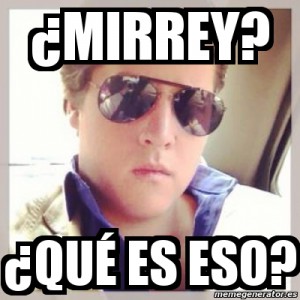Mexican Spanish in 11 Phrases Posted by Jakob Gibbons on Sep 23, 2015 in Spanish Vocabulary
Many people immediately associate Spanish with its namesake country in Europe, but actually Mexico is by far the largest Spanish-speaking country in the world. Its more than hundred million inhabitants have taken this global language and in many ways made it their own: in Mexico, se habla mexicano.
I recently spent about 8 months traveling across the giant country and living in its capital, where I had the pleasure and frustration of learning some of its voluminous and vibrant body of slang. One thing I learned was that, as always, the language gives you some special insights into the culture of its speakers.
Many people would assert that Mexican Spanish is among the most colorful of the world Spanish dialects. CNN México calls Mexican Spanish “sexista, machista y festivo.” And indeed, there are plenty of entries in the Diccionario de Mexicanismos to support this idea.
That same article coloring Mexican Spanish as a particularly dirty and sexist subset of World Spanish also admits that it is “festivo, íntimo, y cariñoso“, another side of the language that I know and love. From being called mijo to being told by others “me caes bien“, I got to experience the many everyday petnames and other expressions people use affectionately with friends and strangers alike.
You should make up your own mind on what you think of the particular variant Spanish spoken in Mexico. The Diccionario de Mexicanismos lists 16,000 entries (¡qué absurdo!), but here I’ll limit it to a super arbitrary 11 of my favorites:
- güey — the most Mexican of all Mexicanisms. It’s like ‘dude’ in English, but perhaps a bit lower class in Mexico. Also written guey, wey, or even just we, it sounds more or less like the English word ‘way’, and you will hear it everywhere in Mexico.
- pedo — I think we can all agree that Mexicans’ obsession with the word for ‘fart’ is amusing. It’s used in every context imagineable: qué pedo is one way of asking “what’s up?” but literally means “what [is your] fart?” Andar pedo doesn’t mean letting ’em rip while you walk: it means you’re drunk.
- padre y madre — Dad and mom figure into more Mexican slang expressions than any other kind of word by far. Generally speaking, padre means cool or good (as in qué padre!), and madre has a whole host of negative connotations, from being messy to being worthless.
- qué onda — Quintessential Mexican. It just means “what’s up”, and if you say it anywhere else in Latin America it sounds like a little Mexican flag falling out of your mouth.
- no mames — This impolite interjection can mean a lot of things. Check out this YouTube video if you want to learn how to use the expression, (but just remember to avoid it or substitute it with no manches in polite company).
https://www.youtube.com/watch?v=9INz9iPARXM
- codo — The word for ‘elbow’ seems unremarkable, but Mexican slang uses it to mean ‘cheap’, usually in a negative sense. If you’re the only one grumbling about the bill at the restaurant, you’ll probably be accused of being codo.
- guero/a — This is a term of endearment with complicated roots in colonial days. A guero can be used to refer to someone light-skinned (like the polite alternative to gringo), but it’s also used widely as a pet name regardless of the complexion of the person being spoken to. ¿Qué necesitas, guerito?
- fresa — A fresa in Mexico could refer to a strawberry, but in everyday speech people use it more to talk about a fancy or posh person or place. You can call a bar fresa if all the people there are fresa and everything is too expensive and fancy. Normally said with a roll of the eyes.
- mirrey — Like fresa but with a definite negative connotation. Think halfway unbuttoned shirts, sunglasses worn indoors, and lots of bling.
- ponerse hasta la madre — Literally “to put oneself until the mother”, this is one of the most colorful expressions I’ve ever heard for getting really, really drunk.
- estar crudo — If you were hasta la madre last night, you’re going to be very crudo this morning. Literally meaning ‘raw’, in Mexico this is how you tell people to turn off that light and stop being so loud. Estoy crudísimo güey!
Have you heard these or similar expressions in other Spanish-speaking countries? What are your favorite Spanish slang expressions and where are they from? Tell us in the comments!

Build vocabulary, practice pronunciation, and more with Transparent Language Online. Available anytime, anywhere, on any device.






Comments:
Fabiola Rodriguez:
Very accurate! I would only add that “no mames” is indeed not a very polite expression, but “no manches” is not polite either. In situation that calls for politeness, you wouldn’t use either one. If you are hanging out with friends, they’re both fine, except that “no mames” is a bit crude.
Diane Dewbeana:
Love to get all of these in my inbox box. I helps me learn so I can keep up with my Latino friends. Keep them coming. Gracias Diane
Jakob Gibbons:
@Diane Dewbeana De nada Diane! If you use a couple of these I’m sure you can get some laughs from your friends 😛
Kate:
I just want to get the emails. Asi padre. See I need help.
ary:
As you say, “madre” has a lot of connotations, but not all of them are negative. Some are quite positive, like: “Eres a toda madre” (you’re terrific). Some depend on the entonation. “Qué poca madre” (you’re horrible, nasty, acted badly) and “Está de poca madre” (It’s fantastic). So, “madre” is tricky. Just like “chingar” (depending on the expression or how you say it, it can be possitive or negative.